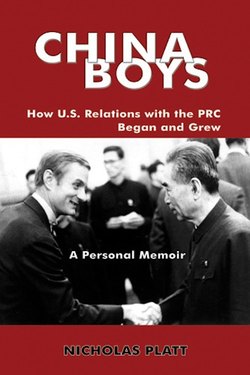Читать книгу CHINA BOYS: How U.S. Relations With the PRC Began and Grew. A Personal Memoir - Nicholas MD Platt - Страница 27
На сайте Литреса книга снята с продажи.
Tales from Prisoners of War
ОглавлениеReturning American Korean War defectors provided unique sources of insight and information about life in China during my time in Hong Kong. Three of these, William White, Morris Wills, and Clarence Adams, left the People’s Republic in 1965 and 1966. Originally, twenty-one POWs refused repatriation at the end of the Korean War and settled in China. All but five had gone back to the United States. These men were among those who had adjusted best to life in China, married, had families, and taken jobs. We were interested in what they could tell us about their lives and treatment.
As they left China, I met each of the defectors and their families on the Chinese side of the border at Lowu, the modest farming village that has since become part of the huge economic zone at Shenzhen. Consular ritual required that I ask some pro forma questions to determine whether any of the POWs had taken actions that might have lost them their citizenship. After making sure that I got the right answers, I walked them across the railroad bridge and took them to Hong Kong by car. Being the first American official they met created a bond that eased for me the debriefing process to follow. They were expecting a sterner welcome than I gave them.
The bucolic farmland of the Hong Kong Colony’s New Territories we drove through was only a more prosperous version of the Chinese side of the border. But the new arrivals went into shock when, suddenly rounding a corner in the mountain pass, they got their first sight of bustling downtown Kowloon and the glittering island of Victoria across Hong Kong’s great teeming harbor. Foreign visitors getting their first look at the instant mega-skyscrapers of the Pudong development zone in Shanghai have much the same reaction today. When I asked the former POWs why they had left China, all responded that their families would have a better future in the United States. Their decade plus in the PRC had convinced them that children of “mixed blood” would have little chance in Chinese society. Seamier considerations drove the departure of some, White and Adams in particular. The Beijing authorities had cracked down on black market activities and implicated both.
All three had something to tell. White, who was African American, in particular, was a brilliant linguist, who had spent years as a top government translator. We learned from him, for the first time, how carefully the Chinese Communist Party kept up with developments at home and abroad. White described a layered system of confidential party publications containing the latest news and articles about China in the foreign press.
The most closely held and voluminous of these, Mei Ri Bao, literally translated as the Every Daily, printed every item on China that appeared each day. Only the top leaders were allowed access, and probably only one of them, Mao himself, had time to read it. It was in this publication, we learned later from Zhou Enlai, that Mao read Richard Nixon’s 1967 Foreign Affairs article calling for rapprochement with China.
The next level of publication, called Reference Materials (Can Kao Ziliao), contained important foreign articles and internal party documents for distribution to senior officials throughout the government and the provinces. The lowest-level periodical was the better-known Reference News (Can Kao Xiaoxi), which was circulated to all party members.
Morris Wills, also known for his mastery of the Chinese language, had studied at Beijing University and ended up working on the publication China Pictorial. He gave us a sense of the strange cocoon in which foreigners lived in Beijing, as well as the pleasant but guarded existence of intellectuals in the most prestigious university in the capital. The Sino-Soviet rupture in 1960, not surprisingly, created a much stricter and more suspicious attitude toward foreigners. The inner workings of the leadership were as mysterious to Wills as they were to other observers, both native and foreign. He had great difficulty arranging to marry his wife, which soured him on Mao’s China and the prospects for his children there.
Adams (also an African American) had spent the last several years translating children’s books from Chinese into English. He had reportedly made broadcasts for Radio Hanoi in 1965. Clearly a hustler, Adams described widespread demand in Beijing for foreign black market items. He took pleasure in pricing watches in Hong Kong and lamenting the profit he would have made.
With the exception of Wills, who wrote an article for Look Magazine and spent a year at Harvard on a fellowship, these men returned home without fanfare and blended quietly back into Middle America.
